Box by Box: Inventorying the Nancy Walker Papers
Since last fall, the processing team has been focused on inventorying unprocessed collections. Inventories allow staff and researchers to learn more about what’s in a collection, help locate materials of interest, and help staff strategize further processing or digitization work, as resources allow. A previous blog post described inventorying the Stull & Lee records. Currently, processing assistants are inventorying more recent donations to the archives. Over the next few months, we will be featuring collections our staff has found particularly interesting to inventory in their own words.
The Nancy Walker Papers
By Samuel Edwards, Processing Assistant
The Nancy Walker papers, donated to the archives this past year, document the life of lesbian activist and writer/journalist Nancy Walker (1935-1996). Walker was a writer for the Gay Community News, Bay Windows, and the Boston Phoenix, and was a prominent figure in Boston’s LGBTQ+ community from the late 1970s to the ’90s.
Part of what makes this collection fascinating is not just Walker’s own writing, but also her dedication to collecting all manner of LGBTQ+ periodicals and ephemera. Her papers provide a glimpse into the beginning of the gay liberation movement through the eyes of someone who considered herself a political moderate. Her collection is a snapshot of an important time in Boston’s LGBTQ+ history, when the gay rights movement was starting to have real organizing power and institutions like Gay Community News were taking shape.
When I go through the collection, I imagine that I’m Nancy Walker herself, reporting on issues that matter to the gay community that few in the mainstream would cover at that time, and embroiled in a whole mess of loving yet intense intracommunity debate. As someone who has also been involved in LGBTQ+ activism, it strikes me how, in some ways, things have really changed, but in other ways, they haven’t at all!
One item that showcases that complex, interconnected, and exciting social world is the 14th Annual Boston Lesbian & Gay Pride Celebration Calendar of Events, with the iconic Lavender Rhino on the cover. I love these event calendars because it makes it even easier to envision what life was like in this community at the time. It shows many expected social groups and dances, as well as organizations that are still active today, like the Boston Alliance of Gay, Lesbian, Bisexual, and Transgender Youth (BAGLY). However, it also showcases some events you may have never considered, like a Lesbian Whale Watch.
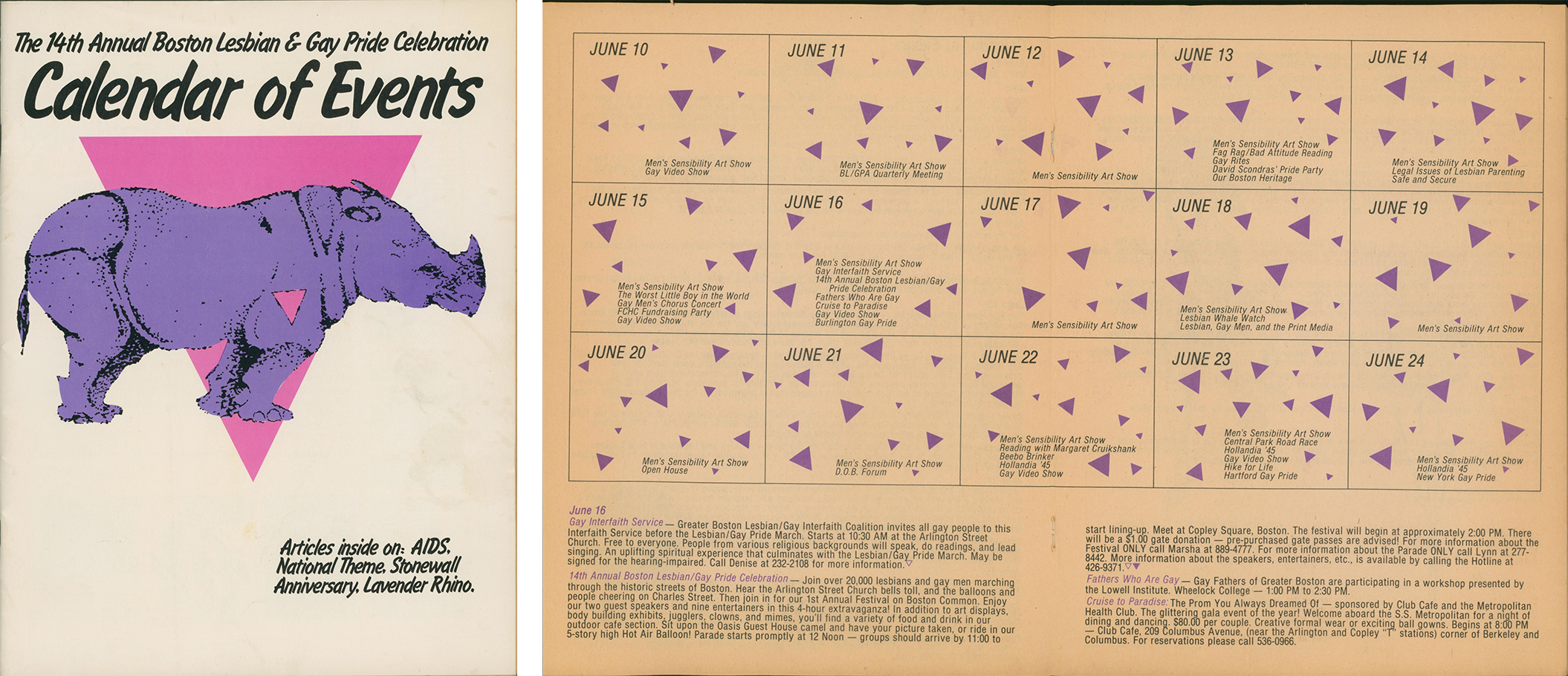
The collection documents more than just Boston history and Walker’s own identities, and some items showcase unexpected LGBTQ+ history. One example is an article from Back/Chat, a newsletter for the Community Homophile Association of Toronto. It was written in 1974 by Lee Paul Anderson, a trans teenager, and describes some of his experiences and frustration with gender roles. This document reflects the history of trans youth prior to contemporary mainstream media attention.
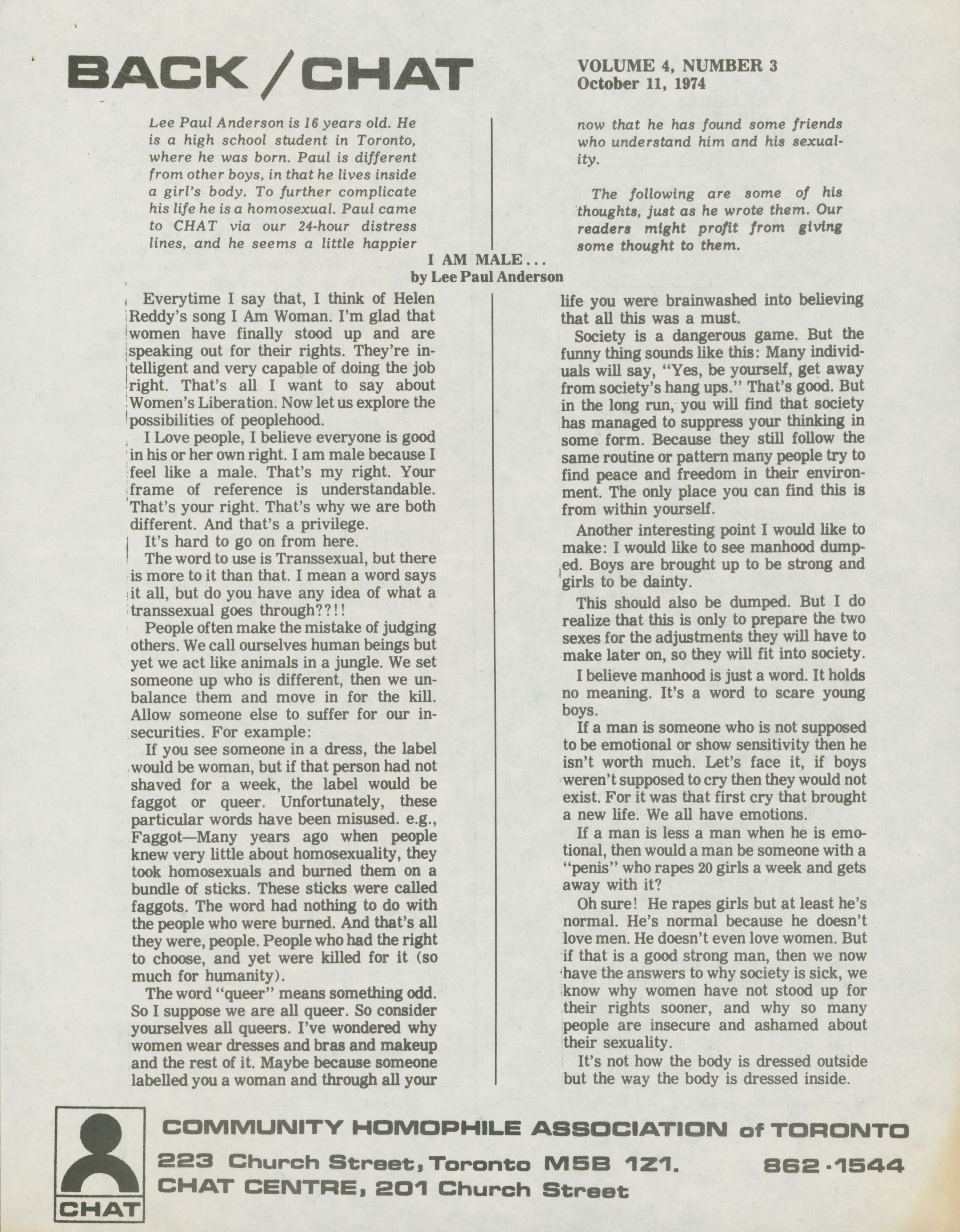
This collection provides a window not into just Walker’s own life, but what the entire LGBTQ+ scene was like in Boston in the late ’70s, ’80s, and early ’90s. You can also get a glimpse of LGBTQ+ Toronto, as Walker lived there before moving to Boston, a fact that highlights how one individual’s life can be a useful avenue into multiple histories.
If you are interested in LGBTQ+ history both in the general and local sense, I highly recommend giving the Nancy Walker papers a look. While you do, I would also recommend listening to Nancy Walker’s interview with the Making Gay History podcast to learn more about her fascinating life.
Contact the Northeastern University Archives and Special Collections by emailing them at archives@northeastern.edu to find out more about how to view Nancy Walker’s papers.
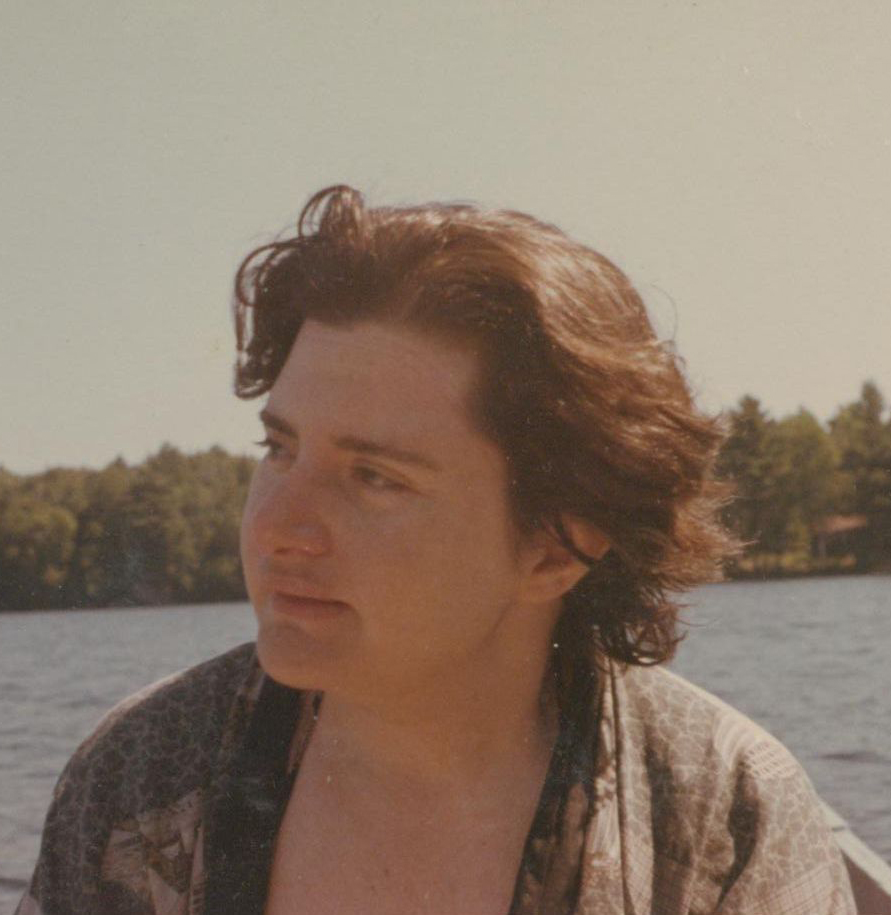
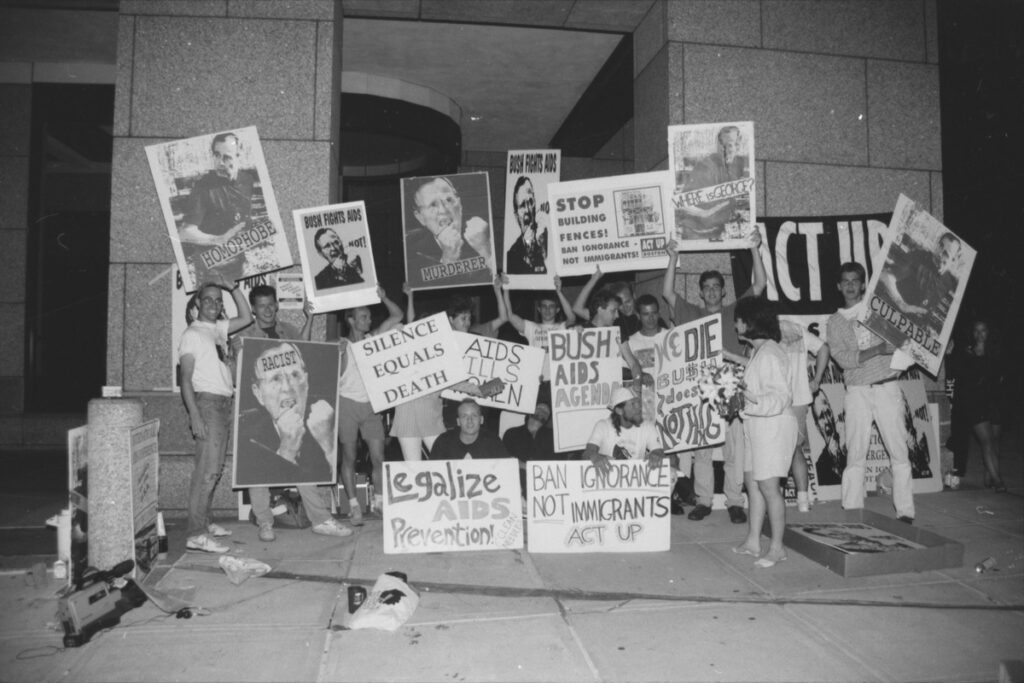
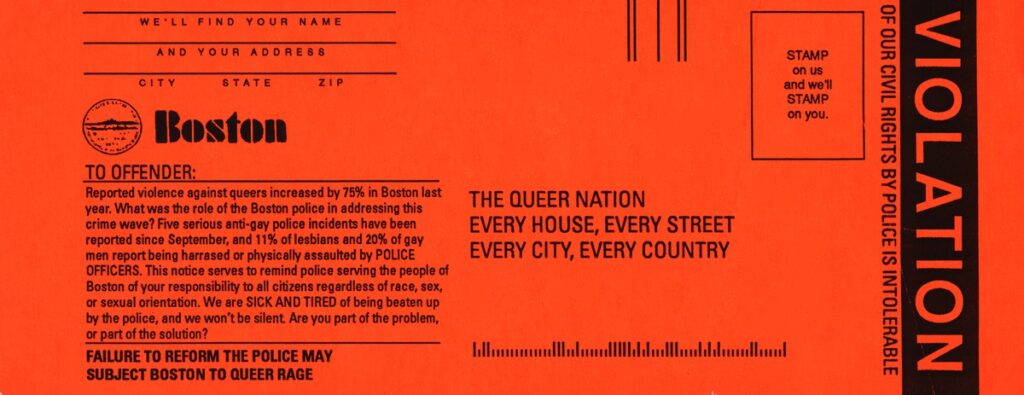
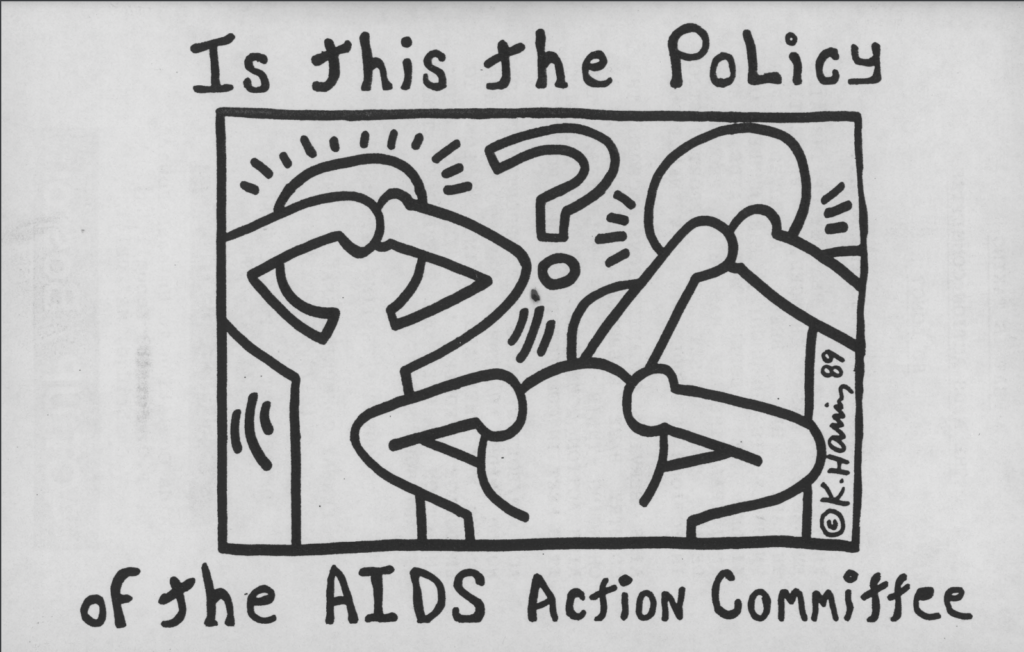
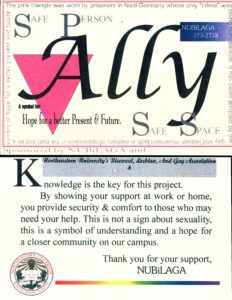
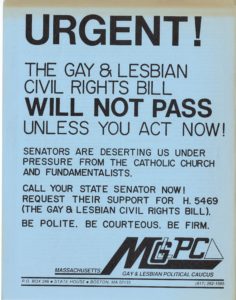
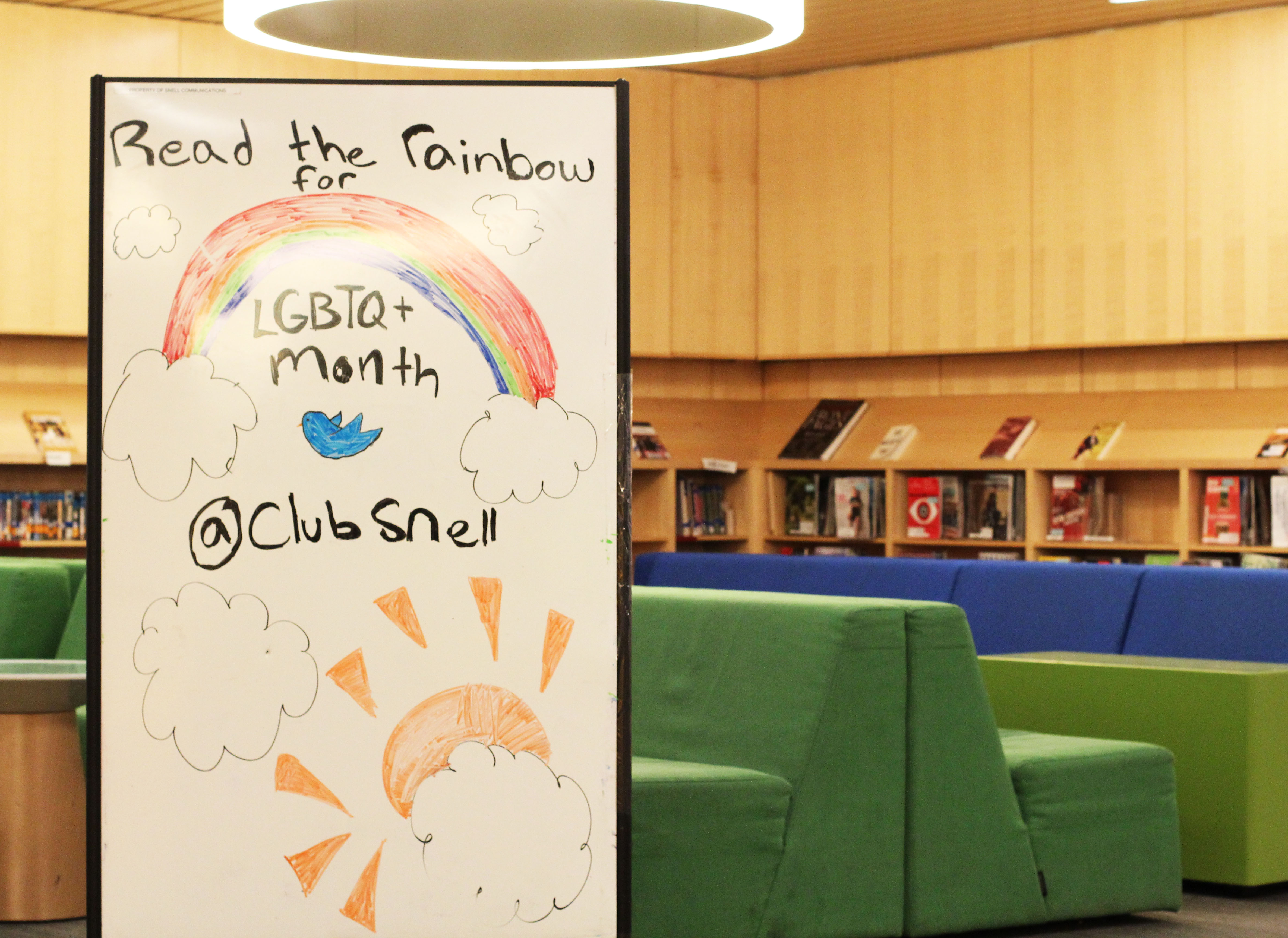 Summer arrives with a celebration as June is the national LBGTQ (Lesbian, Bisexual, Gay, Transgender, and Queer) Pride month. Snell Library is honoring LGBTQ month with our curated Hub display of movies and books by or about an LGBTQ person. Pride month was started in 1995 to honor the 1969 Stonewall Riots in Manhattan, NYC
While it originally began as a 1 day “Pride day” on the last Sunday of June, it has now evolved into a month-long celebration. Across the United States, cities and towns will host parades, bands, workshops, and speaker events focusing on creating a safe space for the LGBTQ community to connect Snell Library is taking part of that celebration by highlighting select works in our Hub collection that touch upon sexuality and gender.
Summer arrives with a celebration as June is the national LBGTQ (Lesbian, Bisexual, Gay, Transgender, and Queer) Pride month. Snell Library is honoring LGBTQ month with our curated Hub display of movies and books by or about an LGBTQ person. Pride month was started in 1995 to honor the 1969 Stonewall Riots in Manhattan, NYC
While it originally began as a 1 day “Pride day” on the last Sunday of June, it has now evolved into a month-long celebration. Across the United States, cities and towns will host parades, bands, workshops, and speaker events focusing on creating a safe space for the LGBTQ community to connect Snell Library is taking part of that celebration by highlighting select works in our Hub collection that touch upon sexuality and gender.
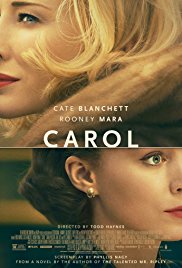
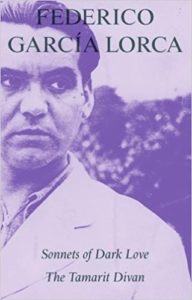 We have the newly released movie Carol, which focuses on two women’s affair in the background of the 1950’s where homosexuality was forbidden. Sonnets of a Dark Love by Federico García Lorca is a collection of poems and essays which centers heavily on the poet’s Spanish heritage and internal struggle with homosexuality during the early 20th century. These poems were written in the later part of his life before his untimely execution by Nationalists at the beginning of the Spanish Civil War.
We have the newly released movie Carol, which focuses on two women’s affair in the background of the 1950’s where homosexuality was forbidden. Sonnets of a Dark Love by Federico García Lorca is a collection of poems and essays which centers heavily on the poet’s Spanish heritage and internal struggle with homosexuality during the early 20th century. These poems were written in the later part of his life before his untimely execution by Nationalists at the beginning of the Spanish Civil War.
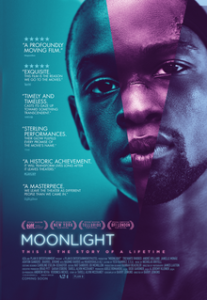
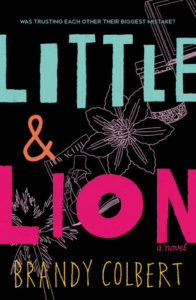 We also have Moonlight, which is the first film with an all-black cast and the first LGBT film to win the Oscar for Best Picture. Lastly, the author of Young Adult novel Little & Lion discusses topics such as mental illness, bisexuality, and intersectional identity This pictures follows the main character through three main stages of his life as he comes to terms with his identity and past relationships. These are but a few of the great movies and books that we’ve put on display at the Hub, come check it out!
We also have Moonlight, which is the first film with an all-black cast and the first LGBT film to win the Oscar for Best Picture. Lastly, the author of Young Adult novel Little & Lion discusses topics such as mental illness, bisexuality, and intersectional identity This pictures follows the main character through three main stages of his life as he comes to terms with his identity and past relationships. These are but a few of the great movies and books that we’ve put on display at the Hub, come check it out!